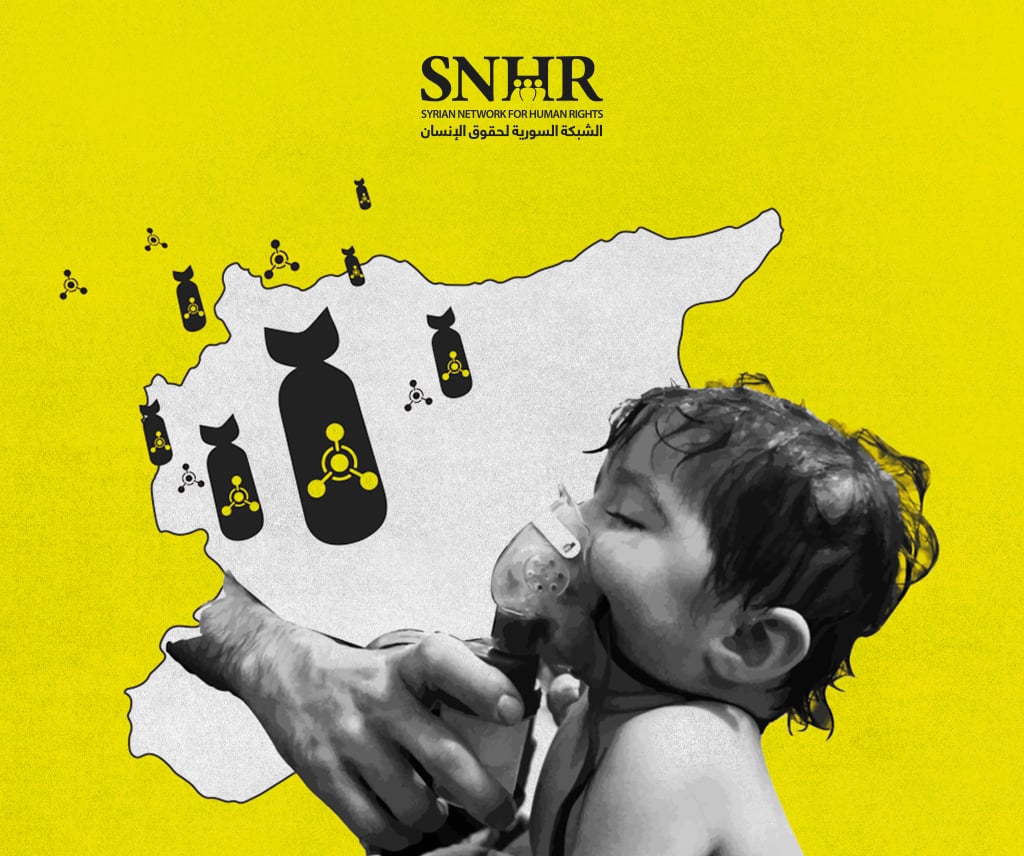No Fewer than 1,514 Syrian Citizens Have Suffocated to Death in Chemical Weapons Attacks, including 214 Children and 262 Women, with 12,000 Injured Still Awaiting Accountability for the Syrian Regime

Languages
Available In
Press Release:
The Hague – The Syrian Network for Human Rights (SNHR) today released a statement in observance of the Day of Remembrance of all Victims of Chemical Warfare, noting that the Syrian regime still possesses a chemical weapon arsenal, with serious concerns about chemical weapons (CWs) potentially being used again in Syria. The group also adds that no fewer than 1,514 Syrian citizens have suffocated to death in chemical weapons attacks, including 214 children and 262 women, while 12,000 are still awaiting accountability for the Syrian regime.
The 9-statement stresses that the Syrian regime’s use of chemical weapons in hundreds of CW attacks, through all of which the regime has had continuous impunity for 12 years to date, has taken place under full and complete Russian protection and blessing. Russia is also directly involved in helping the Syrian regime with hiding its massive chemical weapon stockpile, which has ultimately led to the repeated use of chemical weapons over and over again.
The statement reveals that as of November 30, 2023, the SNHR has documented no fewer than 222 chemical weapons attacks in Syria on its database since the first documented use of this internationally proscribed weapon on December 23, 2012. A total of 217 of these 222 attacks were carried out by Syrian regime forces, while the remaining five were carried out by ISIS. As the statement further reveals, chemical weapons attack by Syrian regime forces have killed 1,514 individuals, divided between 1,413 civilians, including 214 children and 262 women (adult female), 94 armed opposition fighters, and seven regime soldiers who were being held captive in opposition prisons. These attacks also injured 11,212 individuals – 11,080 individuals were injured in regime attacks and 132 were injured in the five attacks carried out by ISIS. The statement also includes graphs summarizing the toll of attacks and resultant deaths, and their distribution by year and by governorate.
SNHR holds the head of the Syrian regime Bashar Assad, who is the Commander-in-Chief of the Syrian Army and Armed Forces, responsible for moving and using chemicals weapons. In emphasizing this fact, the statement stresses that no act of this magnitude and significance, including many far less serious acts than these terrible attacks, can be carried out without his full knowledge and approval, especially given the Syrian regime’s highly centralized, rigidly hierarchical nature. Using chemical weapons is a calculated policy on the part of the Syrian regime based on an executive decision, in which its military and intelligence institutions are incriminated, in particular the leaderships of the General Military Intelligence Directorate, Air Force Intelligence Directorate, the National Security Bureau, and the Syrian Scientific Studies and Research Center (especially Institute 1000 and Branch 450). As SNHR’s database attests, no fewer than 387 individuals, all high-ranking military officers, as well as security officials and civil and military workers, have been involved in ordering and perpetrating these attacks. All of these individuals have rightfully earned their place on the US and EU sanction lists.
Furthermore, the statement reveals that the Syrian regime still possesses chemical weapons, and emphasizes that it is SNHR’s well-founded belief that the regime has established new facilities specifically to store its sizeable chemical weapon stockpile, with serious concerns over the chemical weapons potentially being used again.
The statement calls on the 28th session of the Conference of State Parties (CSP-28) held by the Organization for the Prohibition of Chemical Weapons (OPCW) to make Syria a priority. The statement also calls on the State Parties to take collective measures in accordance with Article XII, Paragraph 3 of the Chemical Weapons Convention (CWC), “in conformity with international law”. Moreover, this issue, and all of the related relevant data and conclusions, must be presented in a briefing to the UN General Assembly and the UN Security Council in accordance with Article XII, Paragraph 4 of the CWC. The statement adds that responsibility should be swiftly ascribed to the UN Security Council, which should be called on to implement the relevant resolutions and to intervene in accordance with Chapter VII of the Charter of the United Nations, considering that a state member has used weapons of mass destruction in a way that poses a serious threat to international peace and security, and to implement the resolutions it adopted in relation to this issue, in addition to making other recommendations.


